Recent Updates
09/27/2024 12:00 AM
Mazda CX-80
09/27/2024 12:00 AM
Mercedes could axe GLC, GLE coupé-SUVs
09/27/2024 12:00 AM
Nominations open for 2025 Autocar Drivers of Change initiative
09/26/2024 12:00 PM
Cyber attack: BMW Z4 vs MG Cyberster
09/26/2024 12:00 PM
Recaro-triggered Ineos stop exposes fragility of supply chain
09/26/2024 12:00 PM
Citroën Berlingo
09/26/2024 12:00 PM
‘Comic opera scenes’ at first ever Japanese GP
09/26/2024 12:00 PM
McLaren F1, P1 successor to be revealed on 6 October
09/26/2024 12:00 PM
Polestar 2 2024 long-term test
09/26/2024 12:00 PM
Leapmotor T03
EV, Hybrid, Hydrogen, Solar & more 21st century mobility!
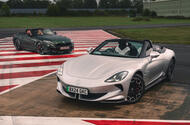
Cyberster's scissor doors set it apart from the more traditional Z4MG is back on the international stage trying to return to its sports car roots – can it upstage one of the best?
Resurrecting the MG brand – known and beloved by so many sports car owners throughout the UK and beyond – to its former glories looks like rather a tall order.
It might even be an impossible task, in light of the kinds of cars that have become its bread and butter in this electrified era. But be that as it may, for the moment, MG Motor looks determined to try.
The Chinese manufacturer’s latest debutant, the MG Cyberster electric convertible, has a suspicious quantity of ‘wow’ factor, doesn’t it? Studiously imitative but undoubtedly pretty styling and scissor doors that motor up at the touch of a button on the key fob, ready to stun anyone approaching its orbit into slightly confused silence.
Can this really have come from the same company that brings us the ZS, HS and 3 – the supermini that was until fairly recently one of the UK’s cheapest new cars? The positing of that question within the minds of anyone who sees a Cyberster seems almost to justify the existence of this car all on its own.
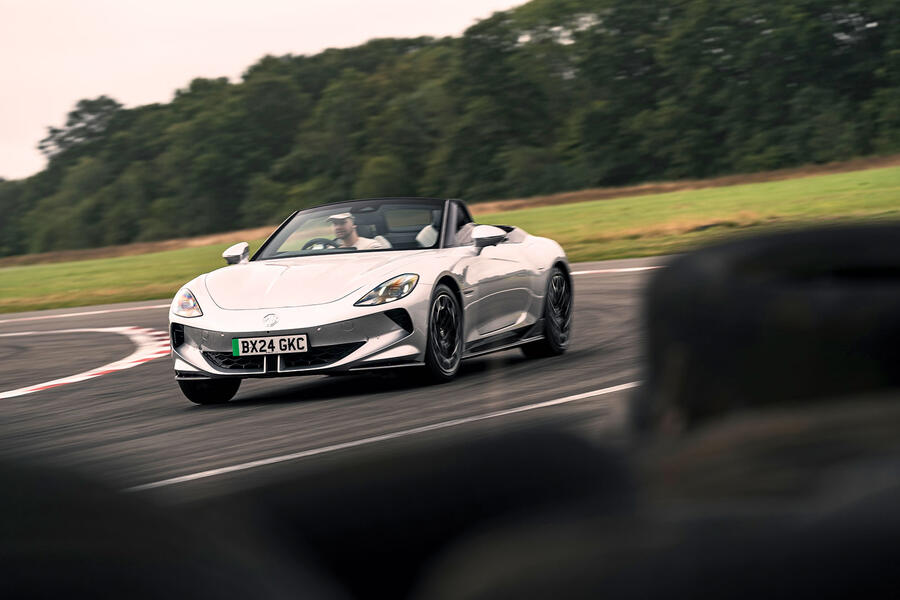
The decision makers at the Shanghai Automotive Industry Corporation (SAIC) must be reasonably convinced, however, that the halo effect of a £60,000 convertible can be brought to bear to motivate buyers of compact hatchbacks and crossovers in 2024.
Beyond the bubble of its introduction, MG Motor UK is said still to be unsure whether it will sell 500 a year, 50 or five. But whichever is the case, you can bet that there will still be a shiny Cyberster sitting proudly in the corner of every major showroom.
For now, here we are, sitting in a brand-new Cyberster, with a combustion-engined BMW Z4 for company. Now to find out exactly what MG is seeking to achieve with this car, who it’s aiming at and how accurately it’s doing so.
Is this the car to relaunch a sporting reputation? Some drop-top, 4.5-metre-long reset button with supercar doors?
Moreover, can it stand up to the competitive scrutiny put on it by a rival from an established European manufacturer that’s surprisingly closely matched on paper, albeit worlds apart on how it’s powered?
If not, and buyers are left to look for other reasons to choose it, could we even call it the ultimate electrified MG sports car?
C to Z
We’ve picked the cheaper, less powerful, single-motor Cyberster Trophy for this exercise, because it matches the layout and performance level of the Z4 more closely, but that does do a bit of an injustice to our newcomer.
The dual-motor, four-wheel-drive Cyberster GT packs a 503bhp punch and would still cost you several thousand pounds less than our 335bhp, rear-wheel-drive Z4 sDrive M40i with Handschalter Pack (read ‘manual gearbox’).
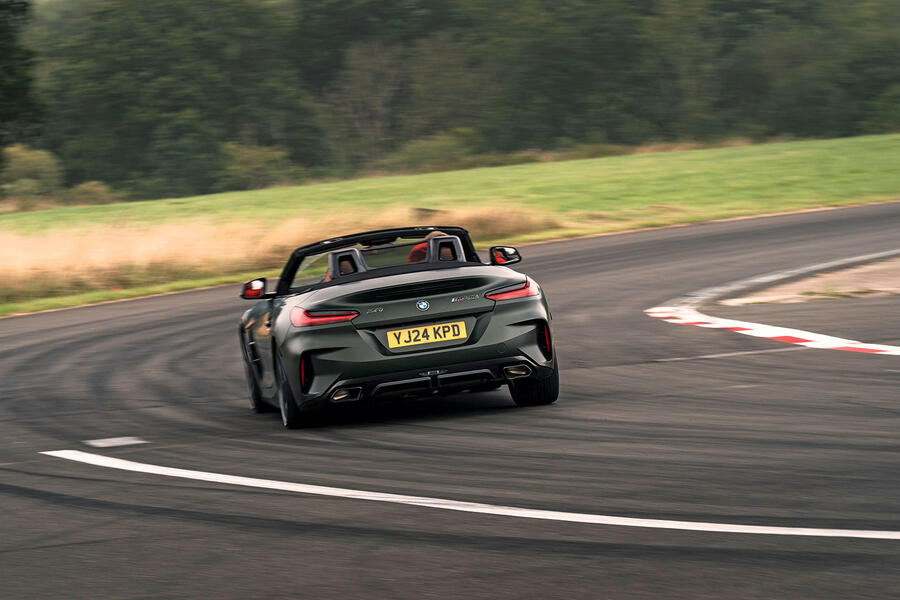
So while electric car owners have been used to paying over the odds for their new-found freedom from fossil fuels, in this case MG is offering either significantly more power and performance than an combustion-engined option might provide as well as zero-emissions running, for a little less outlay, or a similar amount of both for quite a lot less money.
It’s a strong rational departure point for the Cyberster, and it’s backed up immediately by the kind of bodywork that draws glances wherever you go.
While the Z4 is certainly muscular- and technical-looking, its swollen surfaces and imperfect proportions don’t really get close to the more svelte, graceful-looking Cyberster for overall kerbside appeal.
The gap here is significant, and it’s a significant tribute to the MG’s design team (which was led by a Brit from SAIC’s London design studio).
Whether the Cyberster really looks like an MG sports car at all or just a mishmash of so many modern sports car design conventions can be debated.
There’s a hint of the ‘fuselage’ look of the 1990s MGF, a suggestion maybe of the 1950s glamour of the MGA about the rear wheel arches.
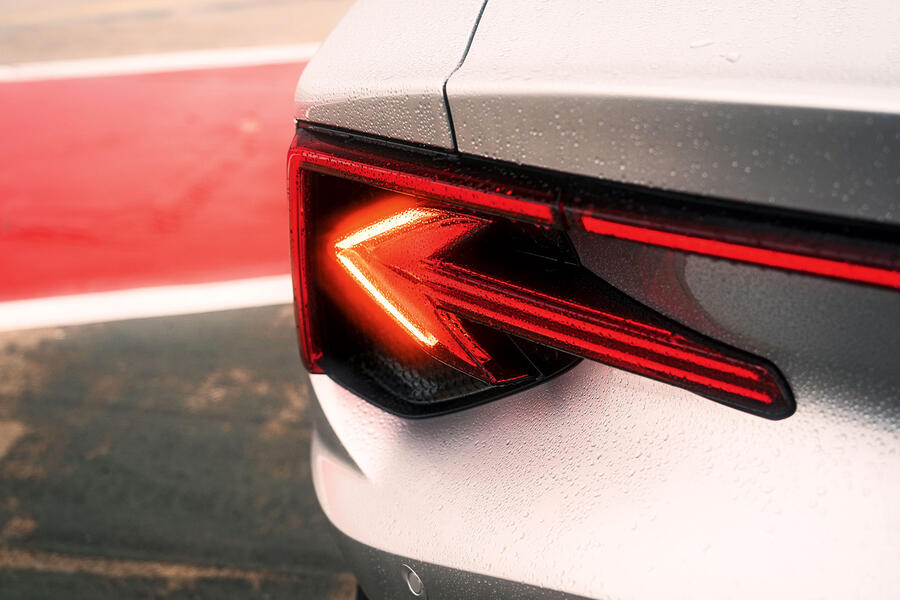
But there’s much more that’s borrowed from other playbooks: the distinctly Italianate nose, the Aston Martin pinch in the waistline, the Lotus Evija-like rear end and the model-name script across the bootlid, which looks like a rearranging of letters nicked off the back of a Maserati Spyder.
Does any of it really matter, though? Considering that we live in a world where, even in MG’s own ancestral home of Abingdon, Oxfordshire, there’s so little collective affection for (or even recollection of) the old car firm left that locals have petitioned the government for the renaming of a pub called The Midget, I’d say probably not.Â
This is a great-looking car, and if it had been uglier but a more ‘on-brand’ retro pastiche of the MGB, well, as you will shortly be reading, we’ve got restomods for that.
The Cyberster is great to be in, too, for much of the time – provided that you’re not particularly tall. In the first instance, its cockpit certainly feels suitably materially lavish and expensive.
Most convertibles at this kind of price don’t come with fascias so widely wrapped in leather and synthetic suede, and while the wider standard on material quality is a little bit glossy-looking and plasticky-feeling, it nonetheless all looks and feels classy and upmarket. The appearance of cheapness isn’t a problem it has.
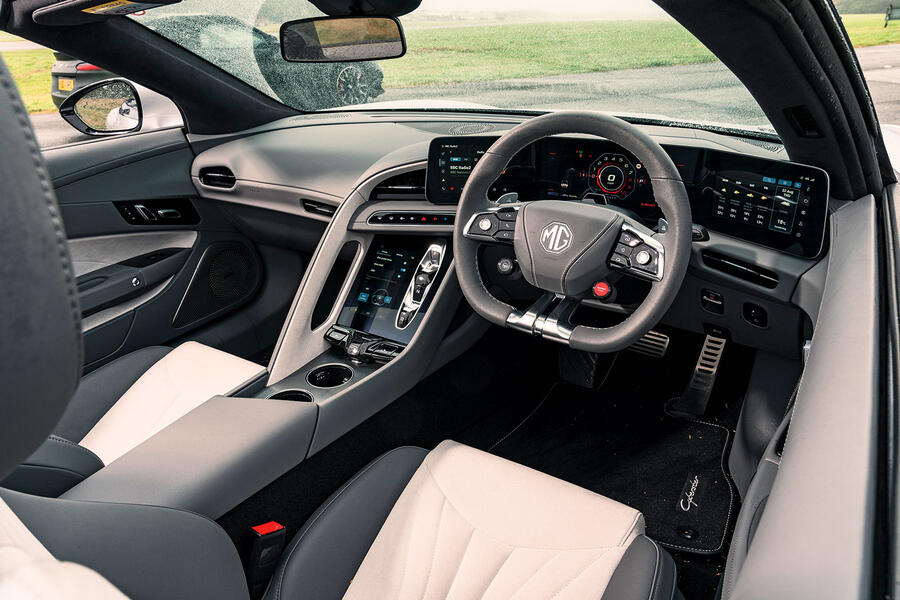
Ergonomic soundness might be, though. The Cyberster’s driver’s seat is set quite high by sports car norms. At 6ft 3in tall, I couldn’t quite adjust it low enough either to adopt the snug driving position that I would have preferred or to get quite enough shelter from the passing wind with the roof down.
It feels as if MG wasn’t quite smart enough with the layout of the car’s underfloor battery pack to make room in what is clearly a fairly tight package for both the 77kWh unit and the occupants above it.
You feel perched up, rather than hunkered down, and if you’re tall enough and like taking the roof down, there’s no getting away from it, no matter how or where you drive.
The lower, straighter-legged, better-protected driving position of the Z4 makes the shortcoming very clear as soon as you switch from one car to the other.
It just feels better thought out, from that driving position right through the layout of its secondary controls. But then BMW was able to put its bulkiest component in its car’s nose, of course.
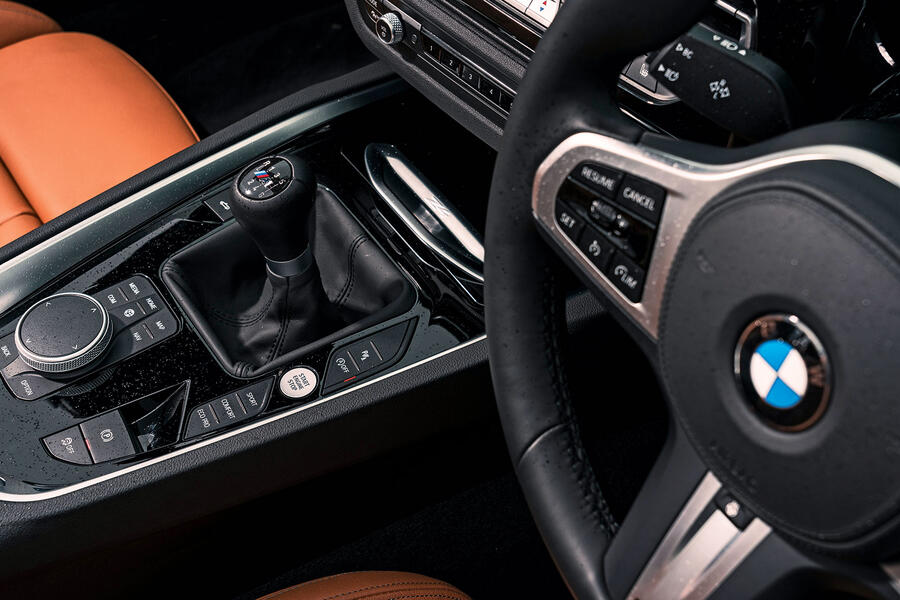
Where the Cyberster goes all in on digital screens (two of which sit behind the rim of the steering wheel, on either side of the main instrumentation screen, and can be tricky to see without craning your neck) and is quite light on physical switchgear, the Z4 retains a reassuring quantity of buttons, some of the functions of which are variously configurable.
The Z4 has more useful cabin storage, too (as McLaren has only lately begun to work out, wing-like doors and conventional storage bins can be tricky to mix for those who would prefer not to leave their house keys at a motorway services).
The material finish and quality feel of the Cyberster probably edge those of the Z4, but there’s no doubt that BMW’s is the more habitable, intuitively usable, better-configured convertible interior.
Differing Ambitions
There aren’t many revelations to be found in the driving of these two cars, but there are one or two surprises.
You would expect the three-pedal BMW with the effusive straight-six petrol engine to be the more charismatic and engaging convertible of the two, and so it proves.
You wouldn’t expect MG to come up with a convertible sports car that sets new dynamic benchmarks for ride and handling, in a segment in which it has no relevant recent experience and in a car with a relative weight penalty of more than 300kg compared with its main ICE opponent, and it duly hasn’t.

And we gave the Cyberster every chance, by the way, by deliberately picking the lighter, simpler, rear-wheel-drive model.
The Cyberster’s driving experience is a little bit of a disappointment, as it turns out, but not simply because it’s no great driver’s car.
What’s obvious by the MG’s particular chassis and steering tuning is that it’s intended more as an open-top, two-seat, luxurious grand tourer than an electric sports car.
So much you might infer from the lavish cabin treatment, then in turn from the fairly gentle suspension rates, progressive control responses and, wind protection for the tall notwithstanding, the isolated, quiet, refined cabin.
Even in single-motor form, the Cyberster has strong, perfectly responsive performance as it flexes its muscles at low speeds. Dynamically at least, the effortlessness with which it picks up speed is probably its best calling card.
To begin with, away from rest, the Z4 would struggle to keep up. But not for long.
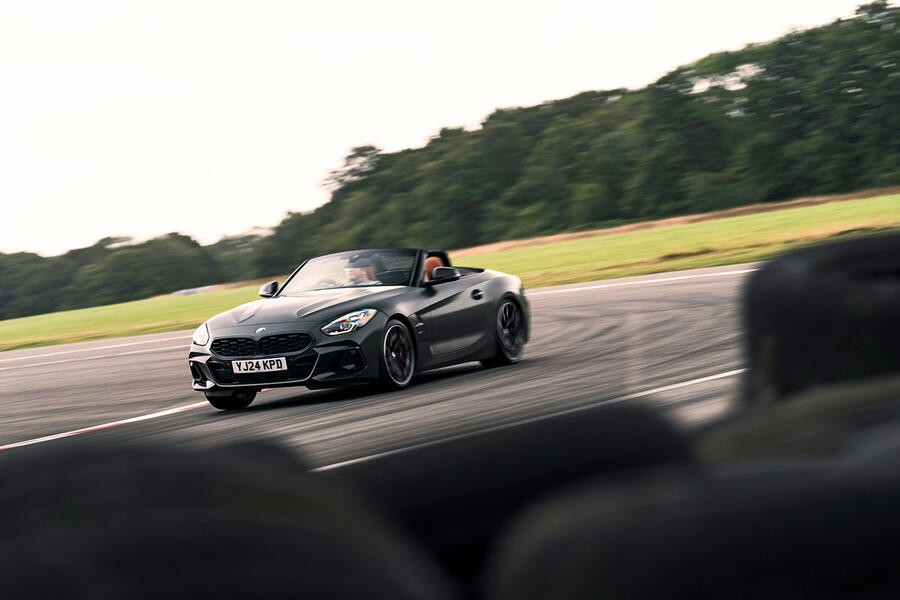
Get the Z4 in the right gear and from about 40mph onwards it feels as quick as the Cyberster, if not quicker still. Its medium-heavy, offset clutch pedal and its slightly elastic-feeling manual shift quality aren’t especially enticing, but they do succeed in keeping you fully engaged in the operation of a cracker of a petrol straight six, and that’s a beguiling task.
So while the MG’s electric motor feels powerful and well mannered, if a bit one-dimensional, the BMW’s engine delivers in both subjective and objective terms (whatever you may think of what it’s running on or emitting).
Most of the difference between the dynamic sophistication of the two cars is the result of their differing agendas. The Cyberster wants to make fast progress easy, to cosset and even to waft a little.
And while that feels a bit incongruous on the road, if the car were simply a few per cent better controlled in its body movements, you might actually never notice its worst habits.
As it is, while it grips and corners well enough, it heaves, pitches and rebounds noticeably when the suspension is given vertical inputs to deal with, so it seldom settles down for long on a halfway-testing A- or B-road.
The Z4 manages much better vertical body control without accepting any meaningful compromise to supple ride comfort. It’s a firmer-riding car, of course, and has a level of outright grip and cornering stability that makes it obvious that it’s a driver’s car first and a cruiser a slightly more distant second.

But more importantly, it feels like exactly the car that BMW intended it to be: brisk but long-striding, taut but still supple, ready either to quicken your pulse or to relax your shoulders, depending on your mood.
With all of its ‘wow’ factor (not to mention plenty of usable range, appealing value, big-hitting performance if you want it etc), the Cyberster is clearly not quite yet the carefully executed and painstakingly honed convertible grand tourer that it might be. It has key strengths, but not yet the kind necessary to turn around reputations and redefine perceptions in the way that its maker may be hoping.
If that’s the process in which MG is now engaged, it will be a long one. But this is a notably emphatic way to start.
1st. BMW Z4 sDrive M40i with Handschalter Pack
Well packaged, well furnished and easy to use, with the dynamic breadth to cover laid-back cruising and enthusiastic pedalling equally well.
2nd. MG Cyberster Trophy
Has plenty of star quality in some areas but scores only competency in others. Usable, efficient and well priced, just unlikely to excite much.

